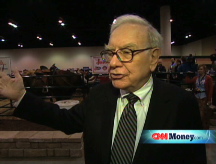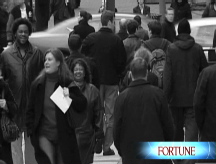Recession? Maybe. Depression? Get real
Yes, the economy is in rough shape. But comparisons to the Great Depression are misguided.

NEW YORK (CNNMoney.com) -- We can't win. By we, I mean Big Media.
There were two distinct camps of responses to my column yesterday about the economy. Some people think that the economy isn't in recession and that journalists are just spreading doom and gloom for various self-serving reasons.
Take your pick among the following: We're trying to get Obama in the White House. We're helping our numerous short-seller friends. Scary headlines generate more reader interest and hence, advertising dollars. (That last conspiracy theory is amusing since it's so untrue.)
But many more readers seemed to think that columnists like me are stooges for not telling the truth about the economy. The government's statistics are all lies! This is the worst economy I've ever seen!
Some are even calling this a Depression, and that's where I think people are going too far. It's one thing to casually drop the R-word even though the economy has yet to report even one quarter of declining output. But busting out the D-word is dangerous and misguided.
Let's look at the history books.
The unemployment rate skyrocketed during the Depression, peaking at nearly 25% in 1933. The current unemployment rate is just 5%. And that's only up from 4.5% a year ago. Contrast that with the far more explosive spike at the beginning of the Great Depression - from about 3% in 1929 to nearly 8.7% in 1930, according to the U.S. Bureau of the Census.
Another hallmark of the Depression was deflation, which is obviously not happening today. Wages are rising - albeit by less than many would like.
The main fear is inflation in the cost of food and oil. And there's reason to believe that inflation pressures may eventually ease since there is a bit of a speculative bubble going on in commodities. Plus, if the Federal Reserve can stabilize the dollar, that could cool off the recent runup in gas and food costs.
Finally, there's the issue of the stock market. I've taken a lot of flack for mentioning the bounceback in stocks since many readers seem to think that what happens on Wall Street does not affect Main Street.
But that's simply not true. Sooner or later, a healthy stock market will help the average consumer. If big businesses are doing better, they are more likely to hire and pay better wages. A rebounding stock market also means more wealth for investors...and many average Americans still have an important stake in the market thanks to 401(k) plans and other retirement accounts.
Keep in mind that the Depression was kicked into gear, if not necessarily caused, by the stock market crash of October 1929. The massive plunge in the value of an asset, in this case stocks, sent the economy spiraling into its most severe downturn in history.
Recessions result from a slow, gradual slip in the economy. The Depression was a product of a one-time shock that took years to recover from. We simply don't have that environment today.
"I don't see many similarities between now and the Great Depression. The economy may be dead in the water but it's not fair to describe it as plunging. That's what happened in the Depression. You had a massive contraction," said Chris Probyn, chief economist with State Street Global Advisors.
And I don't think that the decline in house prices we've seen over the past year is an analogous situation.
Woes in the housing market get a lot of attention. But only a small minority of homeowners are subprime borrowers at risk of foreclosure.
For many people, the decline in housing prices is frustrating, but it is something that can be ridden out. For a lot of people, a house is still a place to live, not a short-term investment to be treated like an ATM machine.
Again, don't get me wrong. I'm not trying to paint a rosy picture of the economy or minimize in any way the financial hardship that many Americans are suffering through right now. We just need to put things in perspective.
"I've never seen anything like this in the housing market," Probyn said. "And for an individual, there are other things going on that could be extremely painful. Adjustable rate mortgages getting reset, gas prices at $4 a gallon, a weakening labor market. These are certainly capable of creating difficulties."
"But the Fed has cut interest rates. Congress has responded aggressively with a fiscal stimulus package," Probyn added. "One of the problems in the Great Depression was that there was no fiscal policy employed preemptively to stop it."
So to call the current state of the economy a recession may be a tad premature. But it's probably close to accurate. To label this a depression, however, is downright irresponsible.
Issue #1 - America's Money: All this week at noon ET, CNN explains how the weakening economy affects you. Full coverage.
Gas prices have climbed to record levels. Are you feeling the pinch? Tell us how gas prices are affecting you and what you're doing to cope. Send us your photos and videos, or email us and tell us what you think. ![]()




